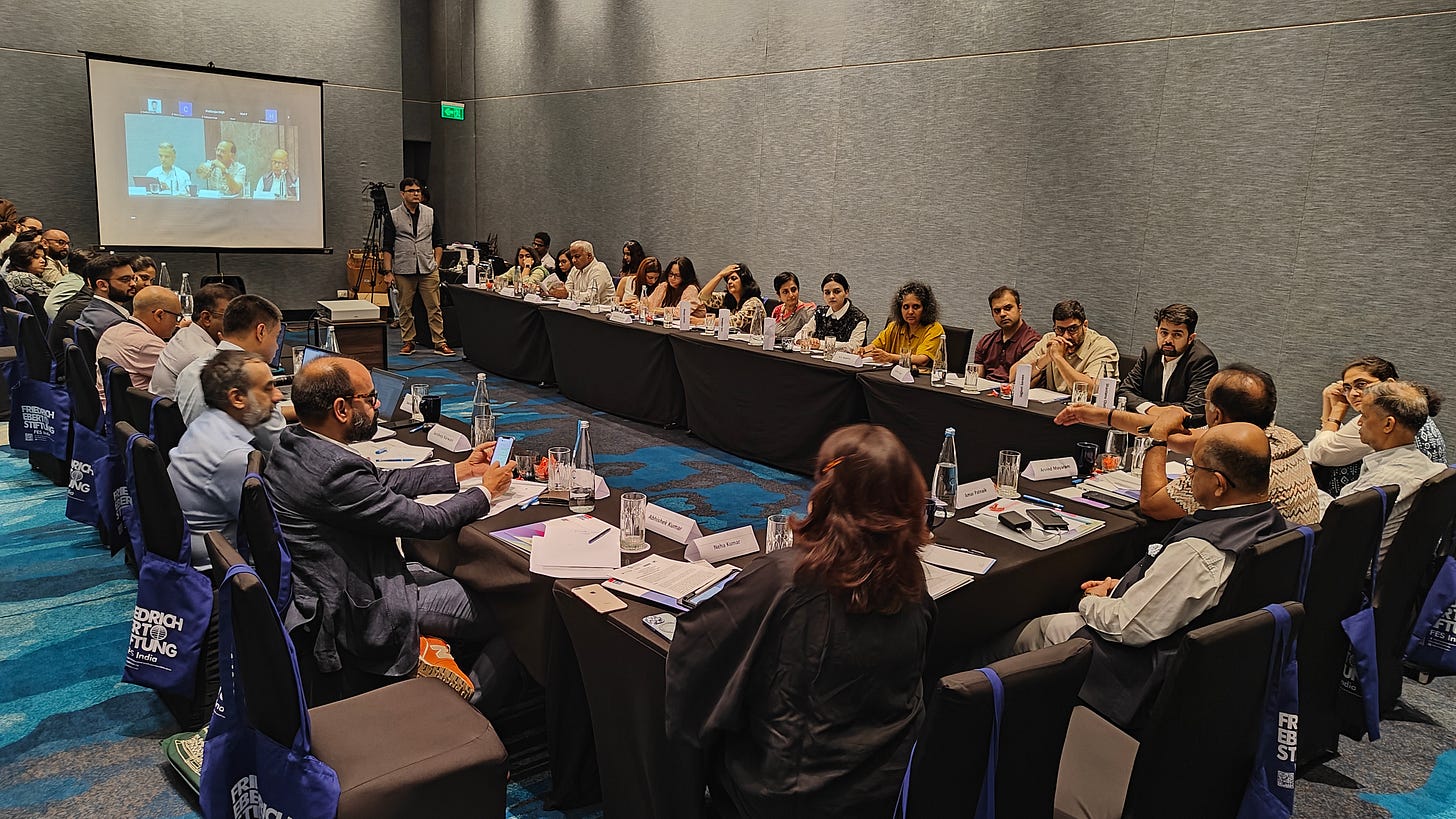Neural Network: July Edition
A Monthly Newsletter on AI Policy and its Multistakeholder Regulation, from the AI Knowledge Consortium
Recent Developments in AI Policy
Union Budget and the Technology Focus
The IndiaAI mission is a comprehensive national-level programme aimed at establishing a comprehensive ecosystem for “catalyzing AI innovation”. The mission was allocated ₹551 crore ($66.3 million) in the Union Budget released this July to be deployed across its seven pillars:
enhancing compute infrastructure
an innovation centre
indigenised datasets,
an apps-development initiative
skills development
startup financing
AI safety and ethics.
The allocation in this year’s Union Budget for the Ministry of Electronics and Information Technology (MeitY) has been increased to ₹22,000 crore ($2.65 billion), an increase of over 52% from last year - a majority of which is allocated to emerging technologies such as the semiconductors programme.
This reflects commitment to improve India's tech and digital infrastructure. The efficacy of IndiaAI will rest on the design of public procurement processes currently underway.
AI Governance: India’s Parliamentary Focus
Policymakers emphasise the need to align current regulations with AI’s emerging challenges, but questions about comprehensive regulatory measures remain unanswered
The ongoing Parliament session provides insight into how lawmakers may approach AI regulation in the near future. The focus appears to be on adapting existing laws to meet the dynamic challenges arising from the technology. In response to a question about the harms of generative AI and regulatory measures to counter them, Jitin Prasada, the Minister of State for Electronics and Information Technology, stated the Information Technology (Intermediary Guidelines and Digital Media Ethics Code) Rules, 2021 and the Digital Personal Data Protection Act, 2023 were already in place to address these. However, he did not address whether the government would conduct assessment studies to examine AI's impact on privacy or any plans to create a regulatory framework to ensure the ethical development of the technology.
The government announced it was working on recommendations for a regulatory framework for AI, which it planned to unveil by June-July 2024 but which is still awaited. Prasada did not directly respond to questions about the obligations of entities under the AI advisories, issued this March. Instead, he emphasised that MeitY issued advisories to intermediaries and platforms to ensure compliance with laws, including the Information Technology Act of 2000. He added such advice is developed after the necessary public consultations. Prasada said the government is committed to leveraging emerging techlike AI for the country’s benefit while managing associated risks.
Global Partnership on AI: India hosts Global IndiaAI Summit, passing GPAI chairmanship to Serbia
Over 2,000 global AI experts and policymakers, academics, and members of the private sector from 50 countries gathered in New Delhi to discuss India's leadership of Global Partnership on AI
MeitY organised Global IndiaAI Summit this July. The two-day event was attended by over 2,000 global AI experts, policymakers, academics and private sector members from 50 countries.
The event comes at the close of India's tenure as Lead Chair of the Global Partnership on Artificial Intelligence (GPAI), which will be passing over to Serbia in November this year. India may also convene a climate change meet in before its chairmanship tenure ends.
United Nations: UN General Assembly adopts AI cooperation resolution
Aiming to bridge the digital divide between the developed and developing worlds, India seems poised to advocate for the 'Global South'
The UN General Assembly adopted a non-binding resolution to enhance international cooperation on AI capacity building this July.The aim was to bridge the digital divide between developed and developing countries.
The China-backed resolution follows another US-backed one this March that called for safe, secure and trustworthy AI systems globally. India may also push for a resolution in the days ahead, highlighting the concerns, needs and opportunities relating to the Global South.
Networking and Workshops
Catalysing AI for Climate Action and Finance
18th and 19th July, 2024 | Hyatt Centric, Candolim, Goa
A diverse group of stakeholders gathered to discuss whether AI could help in bridging the climate finance gap for a resilient net zero future. The discussion repeatedly emphasised the need for vast data to assess climate risks and develop transition strategies across sectors like energy, transport, urban development and agriculture. AI's role in organising this unstructured data is vital for project developers, investors, insurers, government officials and ordinary citizens.
The event was organised by two AIKC members, New Indian Consumer Initiative (a community-owned platform to promote consumer issues) and Transitions Research (a think tank focussed on the complex interplay between technology, society and sustainability in transition processes). Climate Bonds Initiative, an international, investor-focused not-for-profit, served as the knowledge partner, and the convening was supported by Friedrich Ebert Stiftung.
An outcome report will follow! Watch this space.
Work by AIKC Members:
Inventorship of AI-assisted inventions by the Esya Centre: This paper explores the academic viewpoints and international trends around the recognition of AI as an inventor.
Understanding generative AI’s implications on Gender Using a Value Chain Approach and a UNGP Lens, by Aapti Institute: This report examines understanding the human rights risks that result from the generative AI affecting women and gender minorities offering mitigation strategies.
AI and Your Electoral Fortune, by the Institute for Governance, Policies and Politics: The initiative aims to explore the relationship between AI and electoral processes.
Talking About Transitions: Can AI Help Battle Climate Change in Indian Cities? by Transitions Research: The virtual event examined the intersection of AI, climate change and urban development in India.
Final Thoughts
Very valid concerns about AI’s rising energy costs are growing (it’s estimated that by 2030, AI data centers could account for up to a fourth of U.S. power requirements!) and challenges in monetising its applications are emerging globally.
How must India prioritise these issues? We’d love to hear your thoughts. Write to the editor at Secretariat@aiknowledgeconsortium.com.


